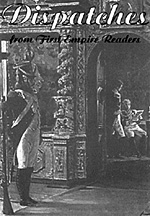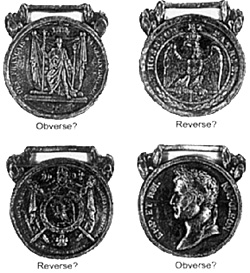Dispatches
Letters to the Editor
from First Empire Readers
| |
Paddy Griffith Aggrieved Dear Dave, I was interested and amused to read John Cook's review (in your issue no.40), of Scotty Bowden's The Glory Years. Unfortunately I have not yet had the pleasure of reading the book itself, but from Cook's review it seems to have fallen into serious error concerning my own work on Soult (which appeared in David Chandler, ed., 'Napoleon's Marshals', Macmillan, 1987, pp.456-477). Bowden apparently believes that I (wrong-headedly) supported Soult's (unjustified) high reputation against Thiébault's (correct) version of that marshal's behaviour at Austerlitz. However, on p.466 of 'Napoleon's Marshals' I actually quoted Thiebault's criticisms at some length, and tried to express my general support for them. Indeed, I have as a result been very thoroughly criticised by Sir Peter Hayman in his exhaustive recent biography ('Soult, Napoleon's Maligned Marshal': Arms & Armour Press, London 1990). In that book Sir Peter tellingly defends Soult against what he sees as a frenzied massed charge by 'maligners' such as Thiébault, Saint Chamans - and Griffith. Hence in this matter I inadvertently find myself on the same side as Bowden even though, together with John Cook, I wholeheartedly deplore Bowden's notorious (and notoriously ill-informed) anglophobia. I hope this sets the record straight about just where the battle lines currently seem to be drawn on the vexed question of Soult's inner character. It does, however, still leave unresolved the interesting question of just how Scotty Bowden could read my essay attacking Soult, and yet come to the diametrically wrong conclusion that I was in fact supporting Soult. I believe that this has to do with the deep linguistic differences between British English and American English. In essence the transatlantic colonial patois is simpler and less subtle than its cis-atlantic progenitor. It has a straightforward directness which seems to exclude the possibility of discursive banter, light irony, or even of seeing both sides of any given question. Literary British English, by contrast, rests heavily (by which of course I mean 'lightly') upon all of those things. Thus in the present case I did in fact present the arguments in favour of Marshal Soult as well as those against, and used only the subtleties of style to hint where my true preferences lay. My British readers (such as Sir Peter) did not mistake my meaning - but oh alas for the Americans! Of course one cannot run a melting-pot population of 300 million immigrants on a language that is native to very few of them, without losing a certain something in the translation - but in this case what has been lost seems to amount to 100 per cent of the meaning. I believe that this is a very serious question for all Angle-American discussions, and not least in the field of Napoleonic studies. Paddy Griffith, Nuneaton, Warwickshire Assassination ... Dear Dave, I was one of the many enthusiasts who attended the excellent Napoleonic Fair reviewed in First Empire 40. The highlights were the informative lectures by Ben Welder and Peter Hofschröer. Following Ben Weider's lecture I bought a copy of the book Assassination at St. Helena Revisited, which he co-wrote with Sten Forshufvud. While the book made a very convincing case that Napoleon was poisoned, other issues were raised which received less extensive treatment. I would be very interested in the thoughts of FE readers on any of the following. 1. The book claims that Napoleon was poisoned prior to his exile at St. Helena (Pages 90, 464). The periods of these poison-induced illnesses coincide with significant military defeats such as Borodino, Leipzig and Waterloo. I fear that I may have missed the evidence for these assertions. Some of the symptoms of arsenic poisoning are cited, as well as some discussion of hair testing. Yet, these claims are not given the same extensive treatment as those ones concerning events at St. Helena. In fairness, these earlier instances of poisoning fall outside the scope of the present book. If this is the case, then why would the authors burden a controversial topic with further claims of poisoning? Alternatively, the authors may be hoping that after proving poison at St. Helena, the reader will be prepared to accept earlier claims of poisoning. This viewpoint is unlikely given the extensive and exhaustive proofs offered by the authors in support of events at Longwood House. The existence of a poisoner at Longwood shows that it was possible for a hostile party to infiltrate Napoleon's inner circle. Yet, the fact that this was achieved at St. Helena is not proof in itself that the same was accomplished in France. The full implication of this claim is that Napoleon's performance during certain key battles was affected by outside forces. This can only contribute to the Bonapartist legend of invincibility. Were the Allies only able to defeat Napoleon because his mental processes were impaired due to poison? Such a conclusion would radically alter our view of the Napoleonic Wars, yet where is the proof? 2. Just as Napoleon is proven to be the victim of poison, the authors suggest that Josephine was also poisoned (Pages 265, 507). Her symptoms are listed, but exhaustive proofs are not provided. While her security may have been more lax than Napoleon's, this alone is insufficient basis for the authors conclusions The inclusion of Josephine's murder edges the authors ever closer to a Napoleonic conspiracy theory. This conjures up visions of shadowy Bourbon figures poisoning prominent Empire personalities. The inclusion of the extract from David Hamilton-Williams' book The Fall of Napoleon describes a Bourbonist network worthy of any conspiracy theorist. Yet again, the authors introduce another controversial issue. 3. The poisoner is clearly identified as Count Montholon. It is at this point that many French academics became less enthusiastic for the authors' version of events at St. Helena. So what evidence is there for an alternative murderer? The authors make a convincing case, but if respected academics have a different opinion, then they ought to have evidence which supports their conclusions. The authors understandably make no reference to any contradictory evidence, but the intransigence of the French academics suggests that such evidence may exist. I apologise for being so verbose, but I hope you will agree that these are intriguing issues. Thank you for your time Phil Nicholls Gorleston, Norfolk Help for Medals
I found them in a local market. They are cast in a sort of steel alloy but there was some 'greening', which suggests the presence of copper or brass. Any ideas please ? Legend on Reverse of Medal shown below. (Trans.) Honour and Country Legend on Reverse of Medal shown above. (Trans.) Napoleon Emp. of French King of Italy Protector of the Confed. of the Rhine Paignton, Devon Back to Table of Contents -- First Empire #41 Back to First Empire List of Issues Back to MagWeb Master Magazine List © Copyright 1998 by First Empire. This article appears in MagWeb (Magazine Web) on the Internet World Wide Web. Other military history articles and gaming articles are available at http://www.magweb.com |

 Can anybody identify these two 'medals' please?
Can anybody identify these two 'medals' please?